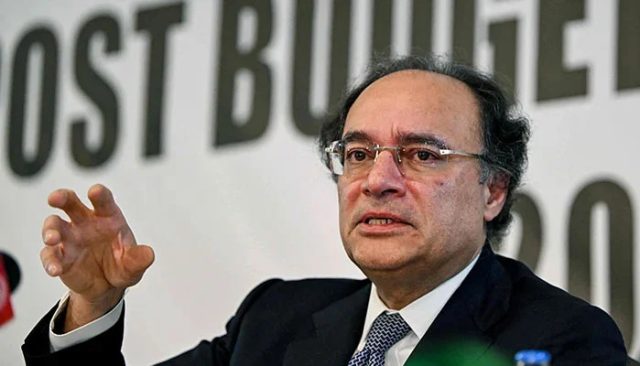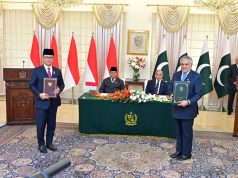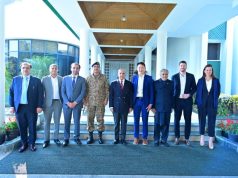KARACHI, Wednesday, April 30, 2025 (WNP): Federal Minister for Finance and Revenue, Muhammad Aurangzeb, on Wednesday expressed confidence that Pakistan can effectively navigate the evolving global economic landscape following the imposition of new US tariffs, citing ongoing diplomatic engagement and a resilient economic turnaround.
Speaking to leading members of the business community during a visit to the Federation of Pakistan Chambers of Commerce and Industry (FPCCI), the finance minister said Pakistan had already initiated constructive dialogue with US officials on the sidelines of recent World Bank and IMF Spring Meetings. He further confirmed that a high-level delegation, as announced by the Prime Minister, will soon visit Washington to negotiate on tariff-related matters.
“Pakistan’s exports to the US stand at around $5 billion, while imports are approximately $2 billion. The average tariff differential is about 3 percent,” Aurangzeb noted, suggesting that the imbalance could be mitigated through increased trade in commodities such as cotton and soybean.
Recounting a recent trip to the US, the minister said the Pakistani delegation held over 70 meetings with officials from the World Bank, IMF, Asian Development Bank, and other key bilateral and multilateral partners, think tanks, and representatives from friendly nations.
Aurangzeb highlighted significant economic improvements, particularly in inflation control and current account management. “The current account is projected to remain in surplus this fiscal year, and government expenditures are under control due to the collective efforts of federal and provincial authorities,” he said.
The minister described the sharp decline in inflation as a major policy success, enabling a 1,000 basis point cut in the benchmark interest rate. He added that the Monetary Policy Committee is scheduled to meet next week, hinting at further adjustments.
Reflecting on Pakistan’s past reliance on IMF support, Aurangzeb termed the current program as the country’s 24th, but insisted it would be the last. “The Prime Minister and his cabinet are committed to making this the final IMF program as we pursue deep structural reforms to ensure sustainable growth,” he said.
He emphasized that tax reforms were a top priority, with a focus on simplifying procedures, reducing human involvement, and leveraging data analytics. “There is no room for blanket exemptions anymore,” he asserted, acknowledging the tax burden already borne by the salaried and business classes and vowing to ease their compliance processes.
The minister announced that simplified tax return forms are in development, aimed at enabling most taxpayers to file without the need for legal or professional assistance.
Turning to the energy sector, Aurangzeb said reforms across the power supply chain—from generation to distribution—have led to reductions in electricity tariffs, with more relief expected in the coming months.
While high financing, energy, and tax costs have historically hampered industrial growth, the minister said recent interest rate cuts and tariff adjustments are beginning to ease the pressure. He added that rationalization of tax rates is under active consideration for the upcoming federal budget.
The budget preparation process has started early this year, with chambers and trade associations actively involved. Aurangzeb revealed that the government is working on separating the Tax Policy Office from the Federal Board of Revenue (FBR), placing it under the Finance Ministry. From next fiscal year, the office will handle all stakeholder consultations on tax policy, while FBR will focus solely on tax administration and collection.
On public finance management, he stressed the importance of downsizing government ministries and privatizing state-owned enterprises to reduce public borrowing and create fiscal space for private sector expansion. “The private sector must now take the lead in driving economic growth,” he said.
Aurangzeb also highlighted the Rekodiq mining project, which has secured financial closure and is expected to begin commercial operations by 2028. “The project has the potential to generate $2.8 billion annually. It could be a game changer for our economy,” he said, adding that expanding and diversifying the export base remains a national priority.




